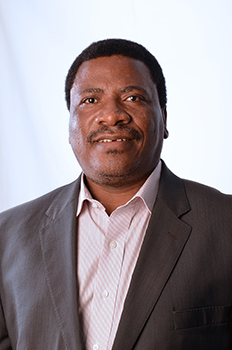 Mr Kgotso Schoeman
Photo: Stephen Collett |
It’s not often that someone is asked a favour by the MEC of Education. However, when it does happen, it is a sign that he has full confidence in you and your abilities. This is exactly what happened to Mr Kgotso Schoeman, one of the Council members of the University of the Free State (UFS).
Mr Schoeman, who was approached by the MEC of Education in the Free State, Mr Tate Makgoe, to serve on the UFS Council, has been involved with the Kagiso Trust for the past 20 years, and now serves as the CEO of Kagiso Capital. The Kagiso Trust was established in May 1985 by anti-apartheid activists, including Archbishop Desmond Tutu, Dr Beyers Naudé, and Prof Jakes Gerwel, in order to channel funds for the promotion of the struggle against apartheid, and for the upliftment and empowerment of communities. Today, education plays a leading role in the activities of the trust.
Mr Schoeman is now serving his second term on the UFS Council. At the start of his term, he expressed a particular interest in learning more about the inner workings of universities, and the UFS in particular. He believes the past two years, have been very informative in this regard.
"I have been very impressed with the academic performance of the UFS, and I have learned a lot about university governance and management during this time. I do think, however, that there is a lot of room for improvement with regard to transformation at the UFS, especially at academic staff level," he says.
One of the issues that he has become aware of over the past two years, and which concerns him greatly, is the relationship between higher education institutions and the Department of Higher Education and Training. It relates to another matter of concern: how higher education should be funded in South Africa.
"These are issues I raise at every Council meeting, because I feel these points are important not only for the future of the UFS, but for all higher education institutions in the country," he says.
When it comes to hobbies, Mr Schoeman loves reading. However, it is not fiction that interests him, but rather books on leadership and the changes experienced by today’s society. “In one of the educational programmes we offer, there are opportunities for people to discuss complicated topics, such as transformation. I find it fascinating to see how people can change their point of view in the course of these discussions.”